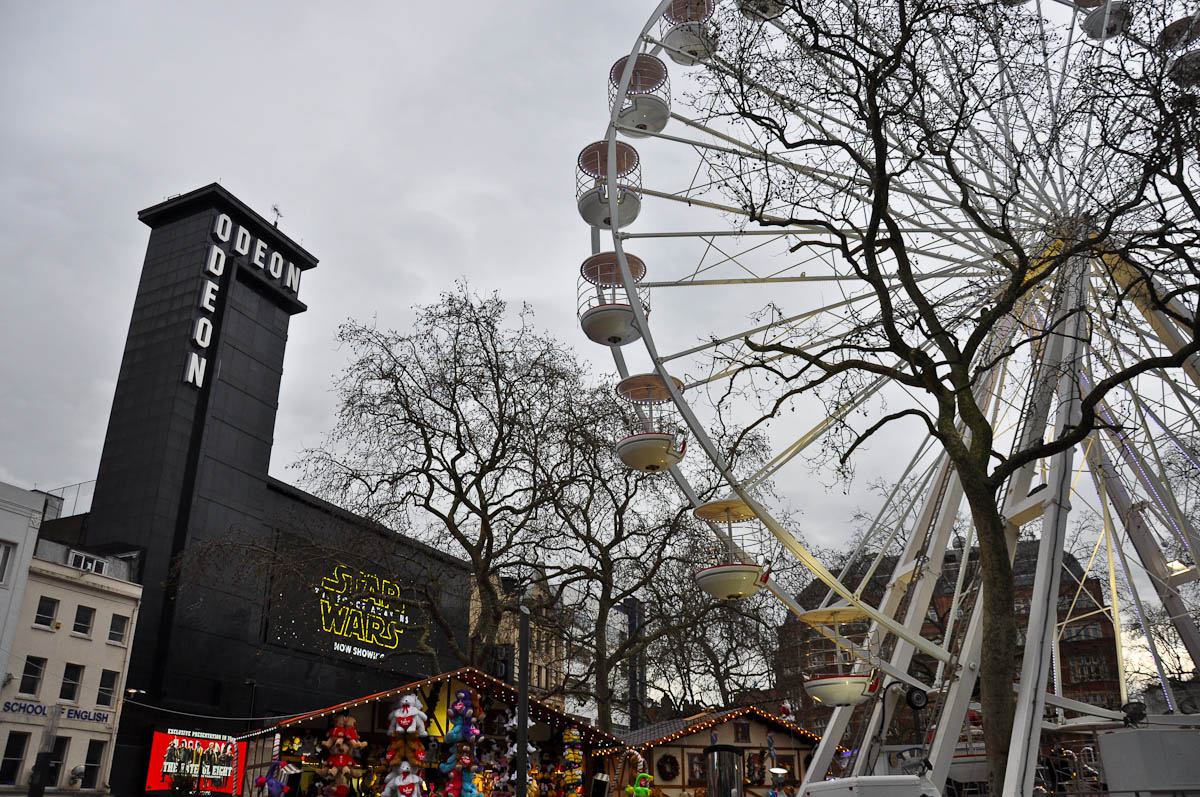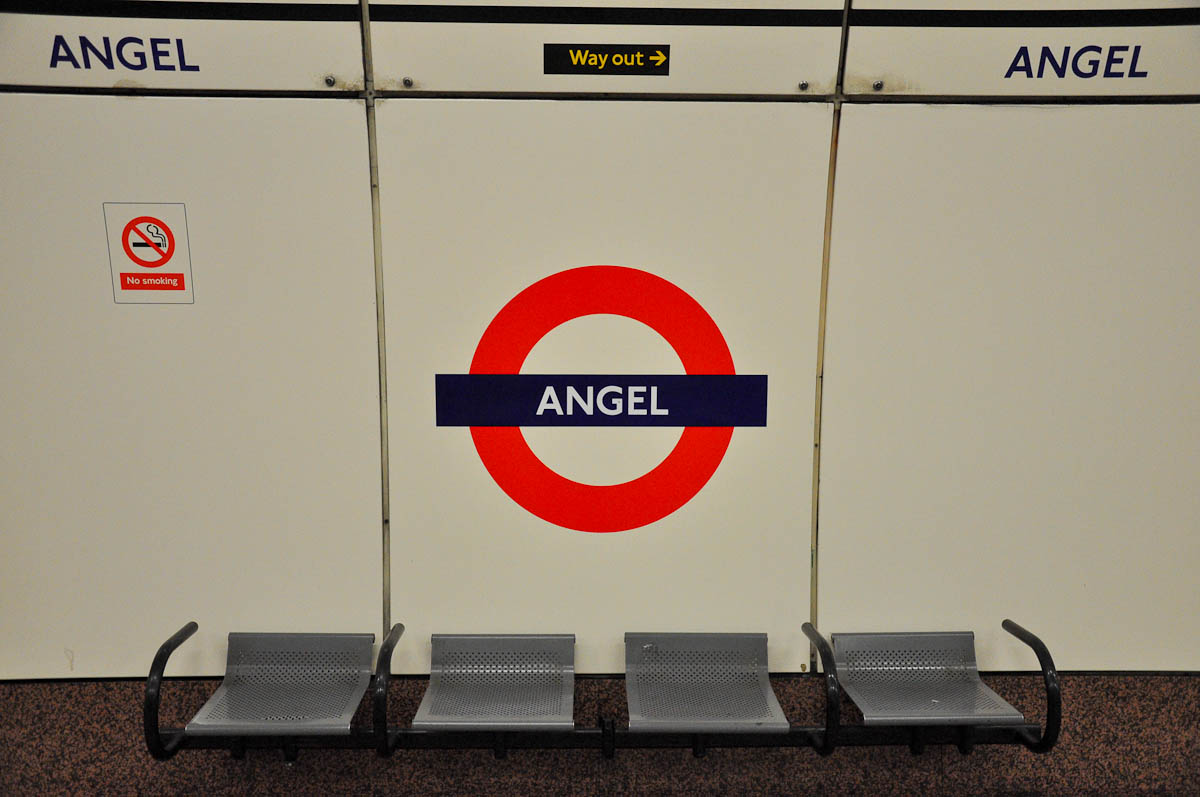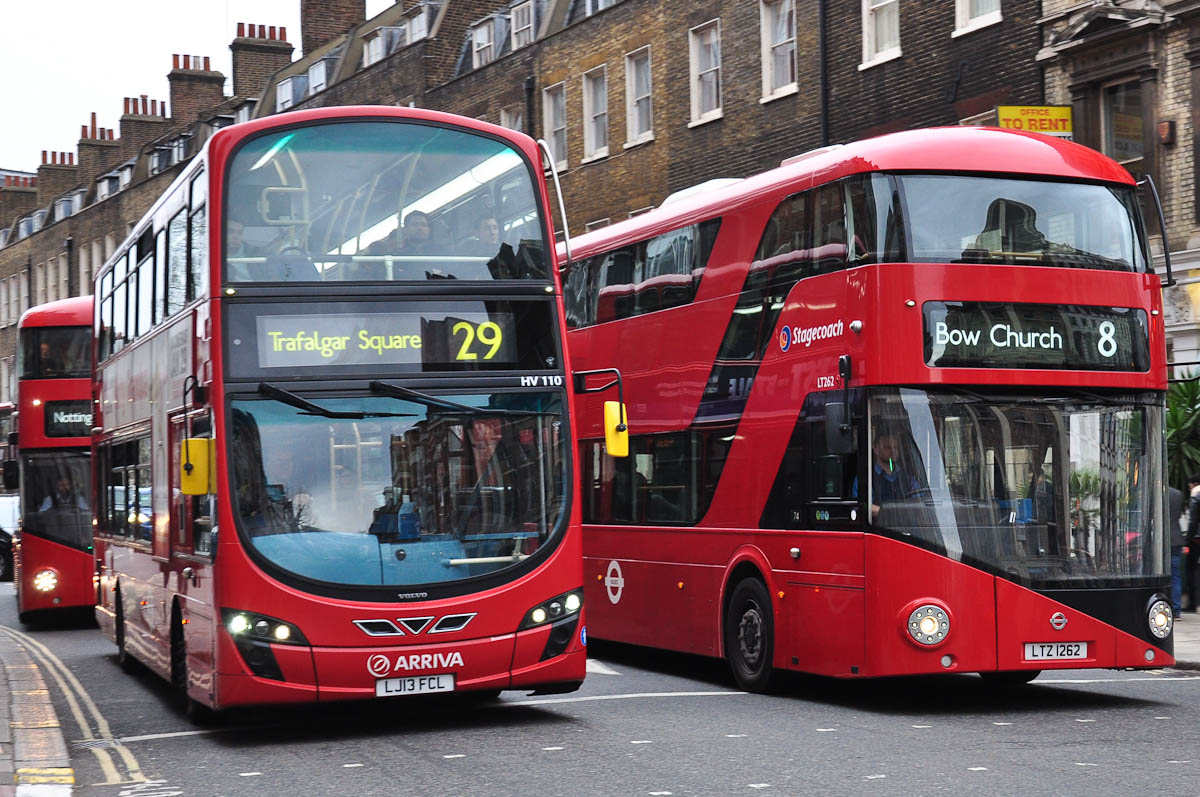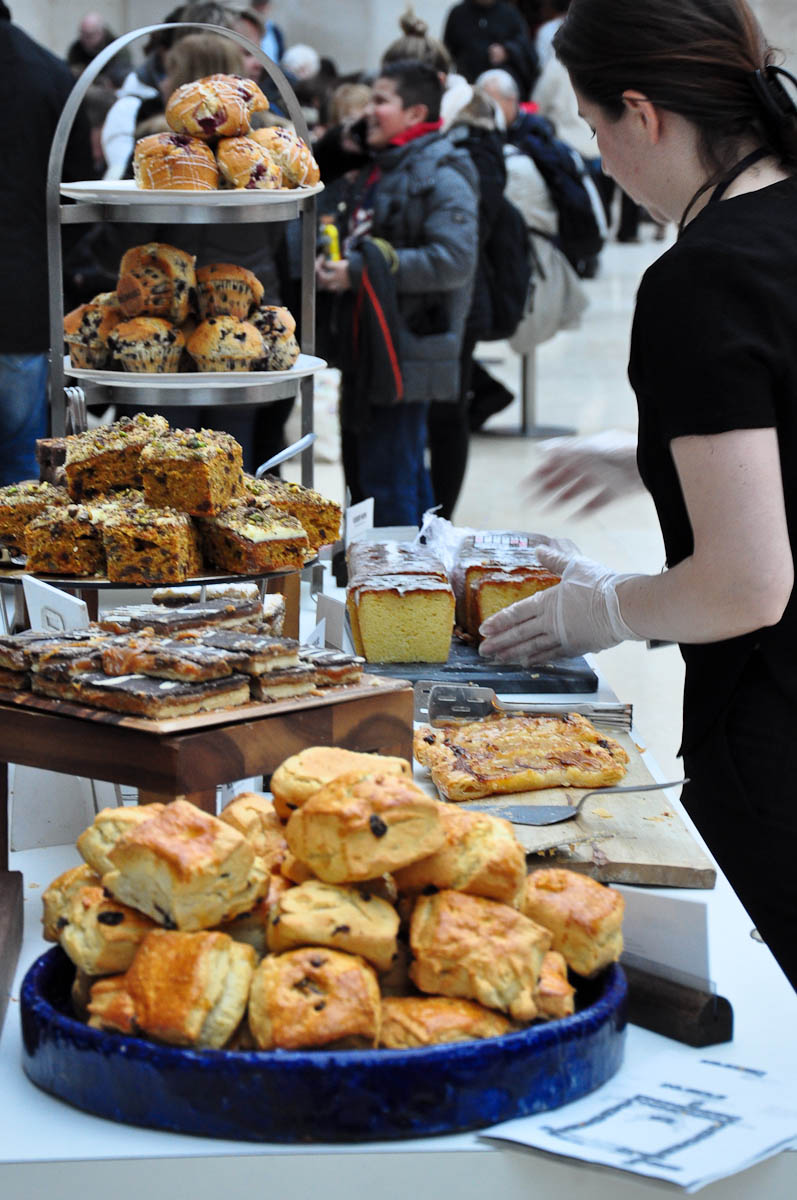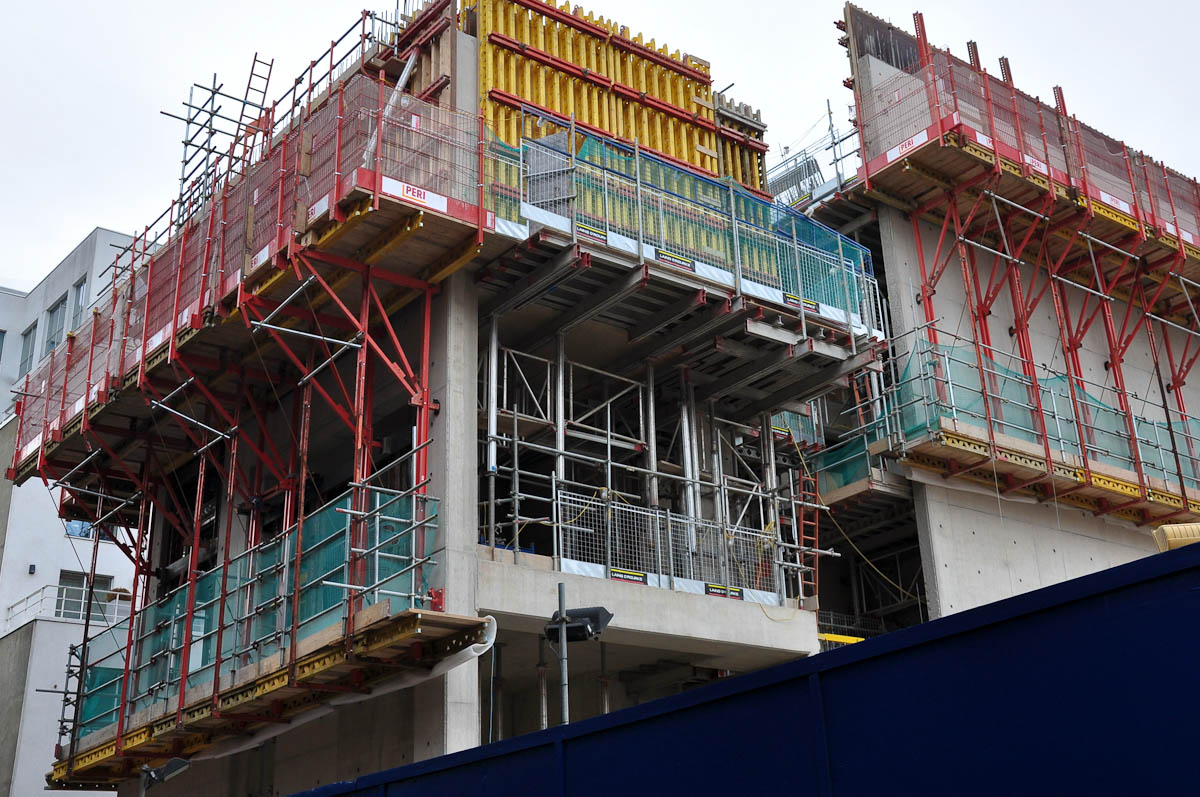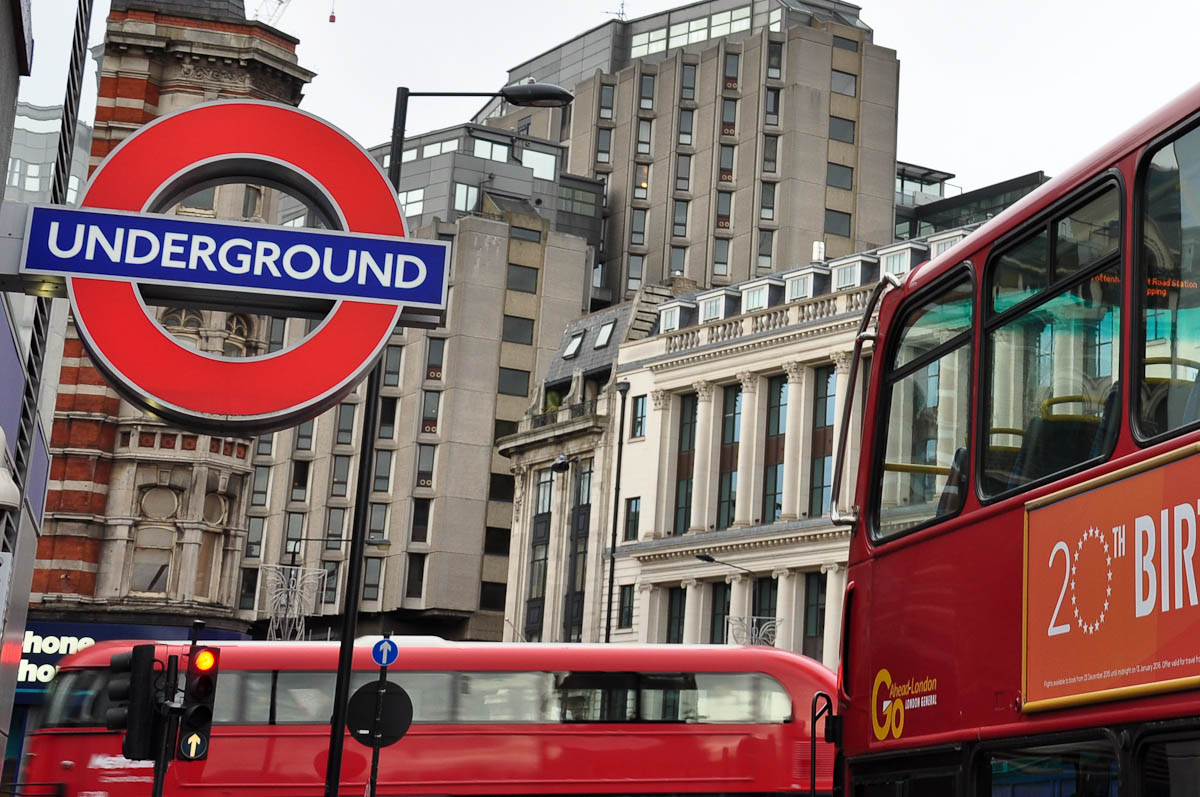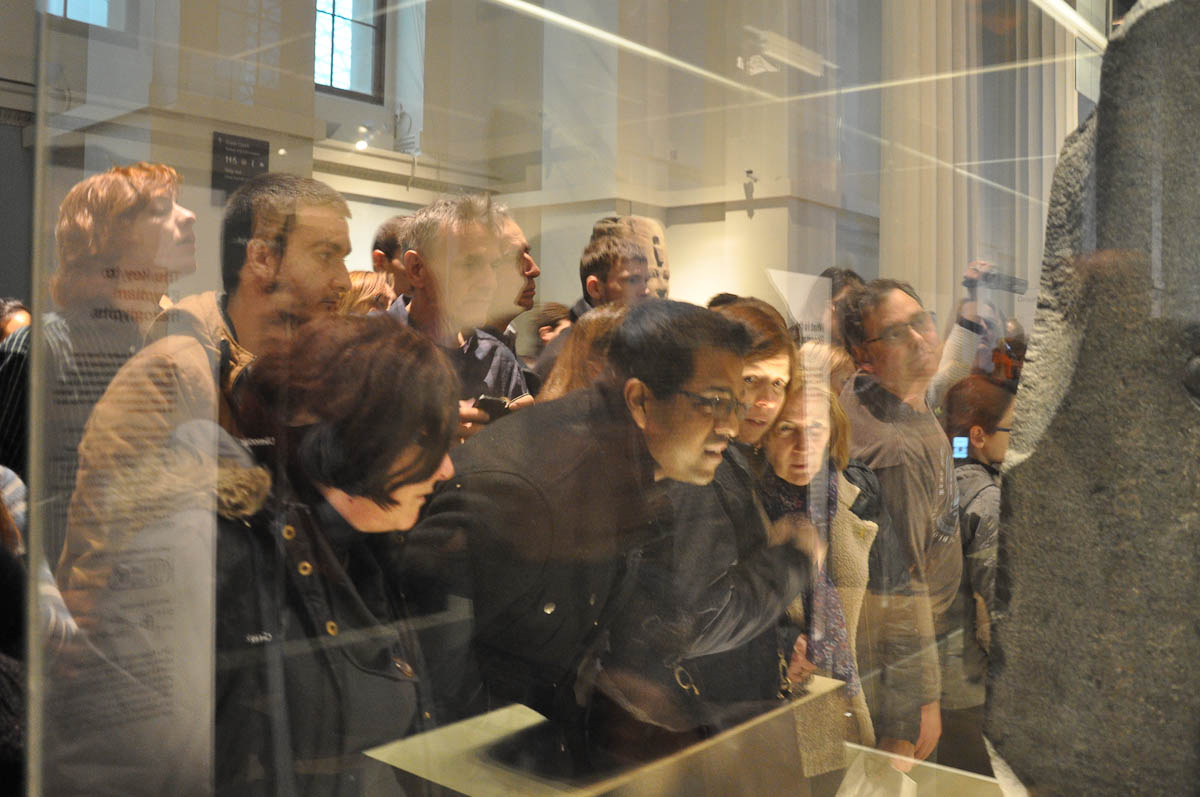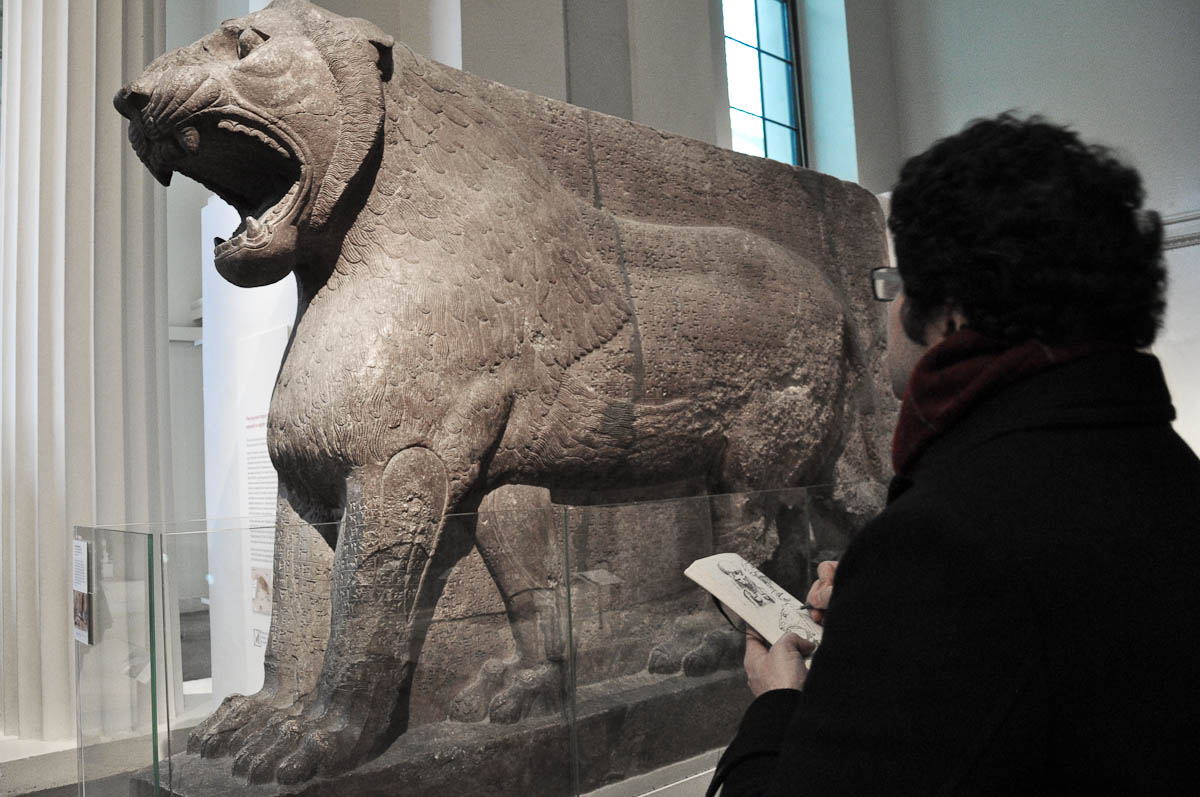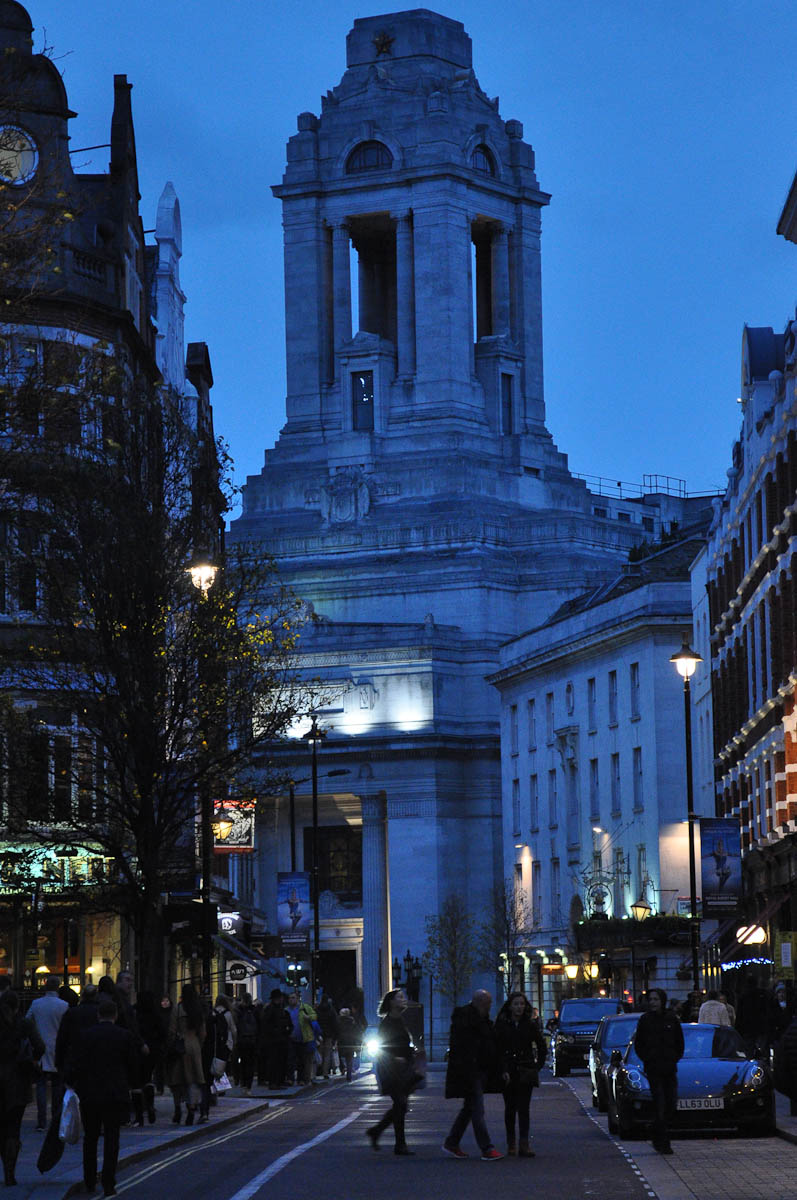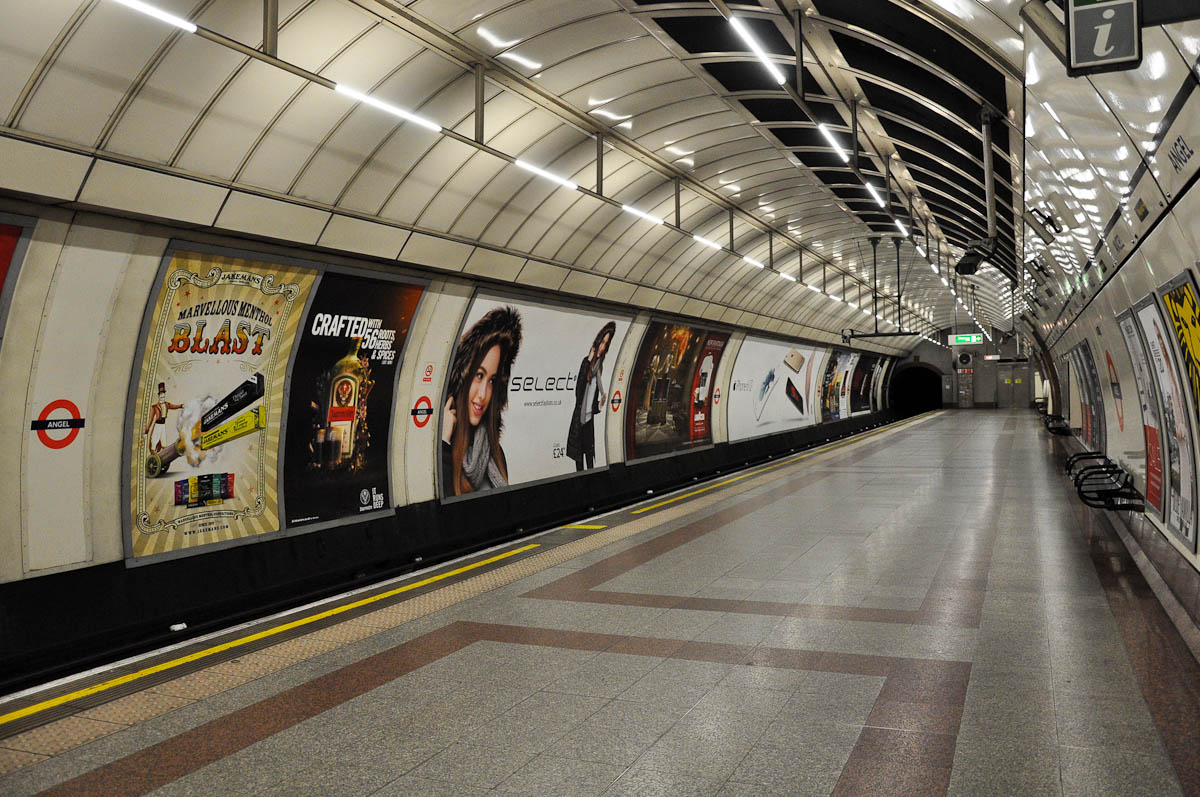I am at a tube station waiting for my train to come.
Tube stations are some of the most curious places in London. Their platforms can fill up with people within a matter of seconds. Just as the train – full to the brim with tourists and proper Londoners (meaning anyone who has lived there on a permanent basis longer than a few months) – leaves the station, the platform – so quiet and empty for a second to a minute max – all of sudden gets flooded by a new mass of people eager to get on the next train.
It is like a human sea coming and going in a never ending cycle of high and low tides respectively fed by and retracted by the steep escalators and the frequently running trains. And during rush hour the flow swells up with people taking over every square inch of the platform yet everyone still manages to keep their personal space and to avoid eye contact.
When you are new to it all, it always surprises you how many people there are in London. Looking at the crowded platforms you begin to get a visual understanding of what it is to live in a city of eight and a half million souls. All dressed differently, all at different stages of their day or night – coming back from work or rushing to their jobs, on the way to an important interview or a romantic date, running errands or simply going out for an hour or two – all seeing and feeling things in a completely different way.
For all the people who live in London, somehow it can be extremely difficult to actually meet people and get to know them, become friends with them and expand your social circle and your life. Especially if you are a freelancer and work from home, as I did for most of the 12 years that I spent living in London. And even if you work and leave your home on a daily basis to get on a train or a bus to wherever you need to be, London can still be a very lonely place.
This is conditioned by the notorious British reserve – the unwillingness or the inability to approach another person without having been formally introduced. There are apocryphal stories of people seeing each other at the train station every morning for years and never exchanging not even one word. This, actually, doesn’t mean that Londoners are rude and would ignore you if you ask them for directions how to get from A to B. It is just that they truly believe that every man is an island and you don’t expect islands to infringe on one another after all.
So, where do people meet in London?! In pubs, clubs, online, at work, through relatives or friends. Or they stick with friendships they have made at primary and secondary school. Outside of these environments it is a bit unusual for someone to simply start chatting up another person or even simply chatting with a person they don’t know. As such, my curiosity is immediately picked when, once on the train, a pretty petite girl sits down next to a fortyish-looking man and immediately engages him in a conversation which lasts for two whole stops.
I have noticed the man before. I couldn’t have missed him, as he made sure to board the train right in front of me, slightly nudging me to one side in the process. Once inside the train he eagerly took a seat and immediately opened a book to read, thus cutting himself off the immediate world. He looks a bit scruffy with a slightly overgrown hair, a small backpack at his feet and baggy trousers on. Not exactly a pin-up.
Yet the girl looks really interested in him. First she opens her tube map under his nose and sweetly asks him for directions. The way she mispronounces the name of the tube stop at which she needs to get off make her sound really cute. Next she shows interest in the book he has opened on his lap. He obliges politely, shows her the book cover and makes some small talk. She nods her head and drinks his every word. She is comfortably, yet fashionably dressed with a long mustard-coloured cardigan. Her hair is shiny and well kept.
I am intrigued! A natural born cynic I speculate in my mind about the reason of her sudden interest in him. Is she just a lovely girl who needs some directions and can’t miss the opportunity to establish a human connection? Or not?
The train is pulling into Holborn and the girl gets up to leave. But first she thanks profusely the fortyish looking man, wishes him a lovely day, tells him how nice it was to meet him and as she walks to the doors of the train she turns back a couple of times to look at him. He is, however, already engrossed in his book, so she gets off and the storyline that has been unfolding in my head comes to a sudden halt.
Soon it is my turn to get off the train and, pressed by the crowd on all sides, I slowly start to inch up the steep steps leading from the platform to the escalator which takes you up to the street. I see a mother with a buggy standing at the bottom of the stairs, then a girl of about twelve carrying a large suitcase down step by step. Right at the top stands a man with yet another buggy and three or four more suitcases. I realise that they are a family and as the London tube doesn’t provide easy access to the platforms at most of its stations, both parents guard a baby in a buggy each whilst their older child carries the suitcases down the stairs.
I have been there before. Not really with two babies and several pieces of luggage, but in a similar situation, carrying a heavy suitcase, a backpack and a bag whilst the crowd would bypass me and largely ignore me. So I stop and politely ask the father at the top of the stairs if he needs some help. He thanks me, but firmly refuses. I understand and walk off. Even though London is largely a safe place, not trusting strangers and questioning the motives of a person offering help comes only too easily.
Outside the air is dense with the human hubbub. I am at Piccadilly Circus and under the neon advertising lights the crowds are huge. I walk for a little bit, passing through Leicester Square, Chinatown, Soho and then I head up towards the British Museum on Great Russell Street. It is past lunchtime and I need to grab something to eat.
Foodwise, I am at the right place, as both Chinatown and Soho are teeming with all sorts of eateries – from swish restaurants to funky cafes – every world cuisine is represented and I can grab a pot of Far Eastern noodles and some dumplings just as easily as a proper Italian pizza, Middle Eastern hummus-based meal, real French patisserie cakes, a Mexican burrito and anything and everything that my foodie heart may desire at that very moment in time.
London loves its food scene. It is not a coincidence that it often gets voted the city with the best food in the world, such is its abundance of places to savour and eat. People living in London are also very much into their food – picking and choosing where to go for their next meal based on exacting food requirements aligned with the latest fads and real research (gluten-free, vegan, meat-free, grass-fed meat, coconut oil, everyone is served), as well as based on a never-ending stream of recommendations by bloggers and journalists alike.
New restaurants and eateries are constantly popping up and you can eat as a king both in the smallest cafe and the fanciest restaurant – you just need to know where to go. I remember having the most amazing salads of my life in a small Italian eatery just off Goodge Street. But today I pass by all the options which Soho and the surroundings areas have laid out without giving them a second thought. First, the sheer choice baffles me a bit. Living quite a simple life in Italy for the past eighteen months, I have become unused to having so much to choose from. Then, the marketing tactics employed to make all of these places wildly successful grates a bit on me.
The colours of the fascias and the menus – all selected carefully for a maximum impact. The words and terms picked to describe the food – fresh, organic, homemade, lush, specially selected, premium. It all starts to ring in my ears and I get the feeling that whatever I choose I will simply be another stat dressed in buzz words in the spreadsheet of a marketing man who has dedicated his life to make people buy specific food. ‘Ahem, let’s see: female, former professional, now SAHM, thinking herself a blogger. She will surely go for the latte with an extra shot of caffeine to keep her alert and will choose a bread-free sandwich to ward off the unnecessary carbs whilst half an avocado will provide her with a zest for life or so she expects’.
All the food being sold is carefully packaged and presented to the different buying groups. It is easily available so as to minimise any preparation times and to satisfy every possible mass taste. When you look closer though you start to realise that the same options are offered in all of the mass eateries no matter how they are branded and packaged. There is always something Thai (chicken curry), something Italian (panini, anyone?!), something Indian (chicken tikka masala), and lately something Moroccan, too. Everything is adapted to the local tastes. Avocado and kale rule the roost. As a nod to the British cuisine, jacket potatoes and thick soups feature prominently.
Today, I realise that I am not interested in any of this. I want some very simple food, nothing which has been cooked in a marketing lab. I also don’t drink milk, actively avoid coffee and, being Bulgarian, I usually have bread with every meal. So, eventually I take the easy way out and simply pop into a largeish Sainsbury’s and pick a sandwich, a banana and a bottle of water off the shelves. Not cool, I know.
A long line of automated checkouts has been installed. They used to irritate Londoners no end with their loud recorded messages mainly advising you to put the scanned item in the bag over and over again. People would get their pants in a real twist over them, hating them with passion and puffing desperately whilst they were searching for the barcode on each product to scan. Every now and then they would call a sales assistant to help them when the screen would get stuck or some other such technology tragedy would befall them.
Although frustrated, they would rarely raise their voices. I used to admire the way Londoners argue and make themselves heard. Whereas in Bulgaria things can get heated really quickly and voices are not only raised, but hands can flail widely around and some choice words can be thrown in the mix, Londoners exhibit a real restraint, yet they are able to enumerate all their disagreements and disappointments in a logical clear manner leaving you in no doubt as to how they actually feel about a place and the service it provides.
I was once on a bus – an old-style double decker with a conductor selling and checking tickets. She was a young girl, maybe in her late teens or early twenties. She kept shouting over our heads: ‘Move forward! Move forward!’. A young man apparently took an exception to her omission of ‘Please!’ and he produced the most scathing yet the most polite monologue I have every heard. ‘You are treating me like a child!’, he complained. ‘I know how to behave on a bus. I don’t need to push other people out of the way. I also don’t need to hear you scream over my head. What is your name? What is your identification number? I am going to make a complaint in writing to your company’. Which, I am sure, he did.
So, I was standing in front of the long line of self-service checkouts. After trying them out in small numbers for a few years, it seems that, after all, they had proven successful, so the shops had rolled them out in much bigger numbers than before. Automatically, I headed towards one of them. I didn’t even consider the long line of manned checkouts running parallel to the self-service ones. Sometimes, avoiding interaction is a very London thing to do.
As I was scanning my three purchases, I heard someone vocalise: ‘Heeellooo! Cooome heeeere, pleeeease. I coooome in peeeace!’. She had a nice deep voice. People in London can be eccentric. May be not more than people living in other places, but it seems the city attracts a certain number of people who are more prone to not only being eccentric (and sometimes frankly bizarre), but also to freely exhibit their eccentricity for everyone to see. So, yes, sometimes the notorious British reserve goes out of the window. You quickly learn to either completely avoid the experience of coming face to face with these characters or, sometimes, you embrace it to your own utter surprise.
I lifted my head. The singer turned out to be one of the checkout ladies just across from where I was standing. I observed her for as long as I could considering the short time I needed to scan my three things. I immediately regretted not being served by her. She was a good singer and turned every sentence into a little singsong.
You know, staff working at these huge British retail places – food shops, department stores, chain outlets – undergo some very specific training as to how to deal with the public. There are rules they need to follow, smiles they need to put on, an unlimited number of ‘Sorrys!’ they need to employ on an hourly and daily basis. The result is a type of service where the customer is always right even if they are returning something that they purchased six months ago just because they decided they don’t want it anymore. It is all done with the purpose of ‘Sell, sell, sell!’ as some retail managers constantly remind their staff through the course of the long day on the shop floor.
It is the type of environment which can really eat at your soul and leave you jaded with regards to people and their many expectations and requirements. Members of staff stop being people or seen as people at least and many customers treat them just as an extension of the shop and at that the one extension which should always agree with them. So, it was good to see one such member of staff simply enjoying herself and turning product scanning into a musical activity. Either that or she was hoping that an unnamed music mogul might walk into the shop at any time and sign her on the spot.
With popular TV shows purporting to turn your dreams into reality at the drop of a hat, it is not surprising that London attracts a large number of creative people eager to find a way to express their talent and hopefully be remunerated for it. For every fine actor you can see on a renowned stage in the British capital, there would be ten more (some even finer ones) either performing their show on the street or in small productions staged in little theatres and even pubs. It is a hard work and payment is often restricted to an equal share of whatever ticket sales the troupe has managed to achieve.
We once saw a street performance by a Canadian lady at Covent Garden (a quirky and beautiful place where lots of street artists stage their shows) and in the end she told the crowd the story of how she had walked into a famous coffee chain that morning and paid £5 for a cup of coffee and something small to eat. Her message was that if we found her funnier than a cup of coffee, then not to be shy and to support her as a street artist by dropping £5 or whatever we could afford in her hat.
But how many people would do it? I mean giving £5 to a street performer rather than treating themselves to a coffee and something sweet from a coffee chain. With all the marketing that goes on, people in London have been conditioned to crave certain things, even though they can do pretty easily without them. So, spending silly money on something rather mundane becomes a lifestyle choice, a habit, a need to keep up with all the other London-based Joneses.
At the same time, with the high prices of life in London and, especially, the incredibly high property prices and rent, more and more people get squeezed out of the capital. Often, young professionals and University graduates can’t afford to rent by themselves even in London’s most undesirable parts, so they club together in small dinky houses with low ceilings and mould on the walls whilst paying in the hundreds if not close to a thousand pounds per month for their small room and a shared use of the kitchen and the bathroom. Or, if by some amazing coincidence (most often parents helping them along), they manage to put together a deposit in order to apply for a mortgage, after a rigorous vetting process by the bank they get a mortgage allowing them to buy on the outskirts of London, if that.
This is why trains and tube, and cars and all sorts of transport are so important for life in London as a whole. Most people can’t really afford to live close to where they work or they change jobs several times through their working life, so they stream in and out of London every single day, spending often hours on their commute – a huge waste of time as a whole, time which under different circumstances could have been spent with their families or doing something that they love.
With the years passing people become accustomed to their long commute and start treating it as something normal, something which is part of life. So, they wake up in the morning, get hurriedly dressed and start for the train or tube station. They catch the same train every day and have spent so long doing it that they know exactly where the doors will be once all the train carriages have aligned with the platform. They position themselves exactly at the same spot and wait for their train day after day, week after week, month after month and then the years pass.
When we lived in Chatham – a small town in London’s commuter belt – I would get up at 6 every morning. The window of my home office overlooked the platform of the local train station, so every day I would see the same people standing in exactly the same configuration waiting to be whisked to London. From afar they all looked sleepy and would clutch cups of coffee and newspapers in their hands. The train would come and they would board and in the fifteen minutes before the next train, another configuration would form on the platform waiting for their daily life to begin.
People put up with such strenuous commutes it in the name of their career, in the name of higher salaries, in the name of job opportunities, in the name of having a job at all. I know it sounds a bit unbelievable, especially in comparison with other countries around the world, but for all its glory and seeming financial superiority, life in Britain can be quite harsh. The crisis crunched many hopes and dreams and reduced the job market significantly. With credit cards maxed up, many people found themselves in a real deep hole. So, even though commuting times are long and uncomfortable, people simply accept them as long as there is a job at the other end of the train line.
The checkout lady in Sainsbury’s keeps vocalising. I scoop my humble lunch off and leave for the British Museum which is about ten minutes away. Once there I lose myself in its huge rooms, among its precious works of world culture and art, in the middle of the dense crowds admiring one-of-a-kind artifacts.
Right at the end of the Egyptian section I spot a young man. He is on his own and absorbed in his work. He stands upright and in a small book he quickly sketches the mythical beast towering in front of him. The curious crowds don’t bother him. He has switched himself off the world and has focused on his inner need of creating art. I observe him for a little bit, catch a glance of his detailed, intricate drawings on the pages of his book.
Switching yourself off the crowds, the constant noise, the many marketing distractions is a useful tool in London. I remember when I used to live in South London, I would take the train to Charing Cross and simply spend my journey in my own bubble, just looking through the window, thinking of my own things, completely disconnected from whatever could have been going around me. And this could have been anything. There was a large guy cared for in the community who would scream and shout, pacing up and down the aisle between the seats, there were professionals going to and coming back from work, there were young girls expertly applying make-up whilst the train moved fast, there was always the one person doing something rather unconventional like clipping their nails, changing their baby’s nappy or listening to some really loud noise qualified as music or summat.
It was like we all were so used to be constantly on the move, that all simple rituals of life created to be enjoyed at home or in a safe private place had been freely transported to the train/tube/bus.
Once, a young not bad looking guy plonked himself on the double seat next to me. He called someone and proceeded to have a long conversation about a music theatre show which was about to open in London in the next couple of weeks. He took a lot of pleasure in slagging down the female lead, who was not a native English speaker, so in the passive-aggressive words of the guy: ‘I just don’t know how she is going to do it. Her English is not so good to say the least. I just don’t see it happening’. Then he proceeded to open himself a can of beer (this was before drinking of alcohol was banned on London transport) from the six pack he had in his bag and relaxed with his drink in hand.
Ah, the drinking – this habitual local pastime. As soon as work finishes for the day, the mass of workers and employees head to the London pubs. When the weather is good (meaning when it doesn’t rain cats and dogs) you can see the crowds of people spilling out of the pubs, standing up, clutching their pints. Some are engaged in lively conversations, others are simply enjoying their own company. As the amazing Bridget Jones put it across (periphrasing very freely, as it has been ages since I read the first two books): ‘As we live in London it feels like we should be visiting museums and other amazing stuff, but more often than not you will find us down the pub.’
As I leave the British Museum, it is definitely pub time. The crowds swell even larger on the London streets. I take my cue – it is time for me to leave, to go back to my family and enjoy a simple night in before our flight back to Italy in a couple of days.


